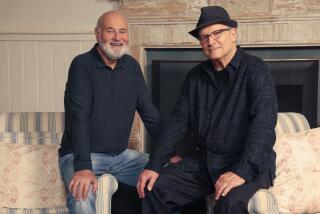A Son Rise of Note
- Share via
“All My Sons,” the play that made Arthur Miller famous, builds to a father’s climactic realization that he has moral obligations to other people’s sons and not just his own.
Among those who will see the current revival at South Coast Repertory in Costa Mesa is the playwright’s lone son, who was born only four months after the play’s Broadway premiere in January 1947.
Robert Miller, a Laguna Beach resident since 1992, has inherited his father’s slender 6-foot, 2-inch frame and his broad forehead. Like his father, he has a long, straight nose and strong, rounded chin.
Miller is not the famous son of a famous father. But he has had success in his own way, as a producer of television commercials, rock videos and now movies.
His first picture, in 1996, was a star-studded, $15-million screen adaptation of Arthur Miller’s most widely produced play, “The Crucible.” His second, which he hopes to begin shooting this summer, is a lower-budget version of his father’s first and only novel, “Focus.” Published in 1945, it’s the story of a casual anti-Semite’s moral awakening and transformation.
Miller, 52, reminisced last week at the Hotel Laguna over a pastrami sandwich. He spoke about forging his own path while growing up with a father--still busy and creative at 84--who is generally regarded with Eugene O’Neill and Tennessee Williams as one of the three greatest American playwrights of the 20th century.
For Bob Miller, the pressure of being his father’s son has been a prod, but never a burden.
“There’s the assumption that if you do something you should do it well, with some sort of passion and intelligence, and leave some sort of mark,” he said. But he feels no compulsion to match his father’s accomplishments. “That’s no way to get up every morning. It’s no way to lead a life.”
Before he became aware of what his father did, Miller absorbed how he did it: He followed a disciplined routine of steady, working-man’s hours spent in the writing studio.
“I’d hear him in there yelling at himself. He was reading the speeches of the characters, [finding out] how it sounds and how it works.”
Childhood Memories of Marilyn
The writing desk, Miller said, is where the man he refers to as “Arthur” to others and “Dad” when they speak is most comfortable. “Life is work to him. I always felt he was there for me and he was my dad, but he wasn’t too hands-on in the day-to-day routine.”
Like his father, Bob Miller has known divorce but is now in a long-term marriage, and like him he has two daughters and a son, ages 16 to 27.
When he was 9, his father left his mother, Mary, to marry Marilyn Monroe. Relations between his parents have been cold ever since, Miller said. His mother, who taught remedial reading in the New York public schools, still lives in the Brooklyn Heights neighborhood where Miller and his older sister, Jane, grew up.
His father remained a steady presence, and he remembers Monroe fondly for a “childlike” side that made her good with kids. “If you were playing a game on the floor, she’d come down” and join in.
Through his high school years, Miller watched his father’s plays being rehearsed under director Elia Kazan and producer Harold Clurman. He also jumped into the burgeoning Greenwich Village rock scene as a roadie for the Lovin’ Spoonful.
He enrolled at the University of Michigan, his parents’ alma mater, but left during his freshman year.
In Arthur Miller’s 1987 autobiography, “Timebends,” he wrote of his uneasiness during the 1960s as Robert and Jane found college “irrelevant” (Miller has another daughter, Rebecca, with his third and current wife, Inge).
“They seemed to have lost something of the success drive that I had more than once lamented as a distorting pressure on my generation. And now I was worrying that they had turned their backs on it! . . . I relied on my faith in them. What would be would be.”
Miller said his father did not harp at him to find a career but was not entirely hands-off. When he professed an interest in film--partly to keep the folks off his back--Arthur lined up a job interview that led to his son’s first movie gig, as a gofer on the set of the 1967 film “Up the Down Staircase.”
Soon, he had the movie bug. He made commercials to accelerate his education in the nuts and bolts of the filmmaker’s craft. But what began as an apprenticeship turned into a 20-year career. As a sidelight during the 1980s, Miller, working with director Tim Newman, produced noteworthy rock videos by ZZ Top (the ones with the hot rods and leggy models) and Randy Newman’s “I Love L.A.”
Though a career making advertisements would seem opposed to his father’s steadfast suspicion of art’s corruption by commerce, Miller finds common ground in their mutual devotion to “well-developed craft.”
But in 1988, feeling burned out, Miller resolved to get back into film-as-art-form, as a producer. This time, he offered his father a job: adapting “The Crucible” as a screenplay.
Arthur Miller complied, albeit a bit warily. “He never had a good experience in Hollywood. He always said, ‘You’re nuts if you want to make movies. It takes forever and you’re at the mercy of so many elements that you have no control.’ ”
Bob Miller doesn’t argue that point. But he is proud that “The Crucible,” starring Daniel Day-Lewis and Winona Ryder, came out precisely as he and his father had envisioned it--and that his father enjoyed the experience.
People who have worked with Robert Miller praise his feel for storytelling, his ability to coach actors, and his seriousness and strong viewpoints about how drama works.
“He has extraordinary insight. Maybe he picked something up from his dad,” said Kendrew Lascelles, who has adapted “Focus” as a screenplay.
Miller directed two plays by Lascelles about 20 years ago--his only stage credits--but the performing arts school at Point Park College in Pittsburgh trusts his dramatic acumen enough to have made him a teaching guest artist.
If pressed to pick a favorite play of his father’s, Miller points to “After the Fall,” from 1964.
He saw it develop from its first reading--in a studio above a New York City deli with his father, director Kazan and star Jason Robards Jr.--to its Broadway premiere. “After the Fall” speaks to him about how his father grappled with the guilt of two divorces, and of his attempts to find meaning and passion in midlife.
Moral Lessons on Stage
The most moving Arthur Miller scene, for him, is the one in “The Crucible” in which John Proctor, a steadfast farmer whose adultery inadvertently opens the door for all hell to break loose in Salem, reconnects with his wife, Elizabeth.
“It’s about forgiveness and redemption, responsibility and morality. From the intimacy of a bedroom to the circumstances of a community, it reverberates around the world. That’s what great writing can do.”
Miller was a small boy when he first saw “All My Sons” with his parents in a summer stock production in Delaware. He says his opinion of the play, about a man who causes the deaths of 21 World War II pilots by selling faulty airplane engine parts to the military, has changed over time.
“It’s the most linear, and seemingly preachy, of his plays. It strikes people as a little square and traditional, but there are surprising relevancies to it”--including the issue of when corporations have an obligation to stop watching out solely for their immediate family of officers, directors and stockholders and take responsibility for product safety.
Miller finds the strong moral stand of “All My Sons” galvanizing, especially compared to the more nebulous outcomes he thinks are too common in scripts today.
“It’s been in vogue recently to not be judgmental, not preach, just lay it out and let the audience take from it what they want. It may be entertaining or thought-provoking, but it doesn’t challenge. You leave the theater the same as you were before.”
Having found his niche, would Miller ever brave direct comparisons to his father and try to write?
“I’ve played with developing a few scripts and ideas, but I’m not as disciplined as I should be,” he said. “I have good instincts, but I don’t know if I have the patience, frankly, or the objectivity [to write well]. But who knows? I’m still young. I could give it a shot some day.”
* “All My Sons,” by Arthur Miller, at South Coast Repertory, 655 Town Center Drive, Costa Mesa. Through April 1. Tuesdays-Saturdays, 8 p.m.; Sundays, 7:30 p.m.; Saturdays and Sundays, 2:30 p.m. $18-$47, with a “pay what you will” performance Feb. 26, 2:30 p.m. (714) 708-5555.
More to Read
The biggest entertainment stories
Get our big stories about Hollywood, film, television, music, arts, culture and more right in your inbox as soon as they publish.
You may occasionally receive promotional content from the Los Angeles Times.











